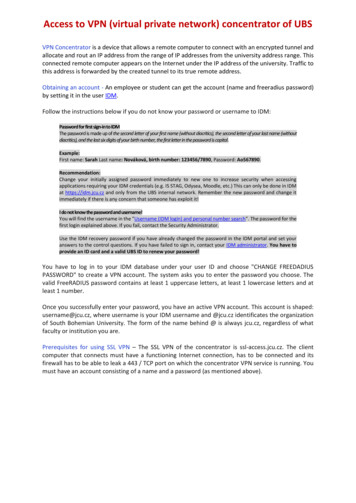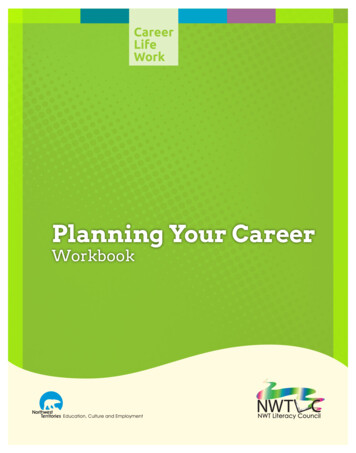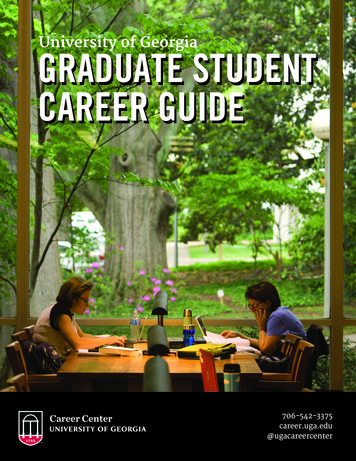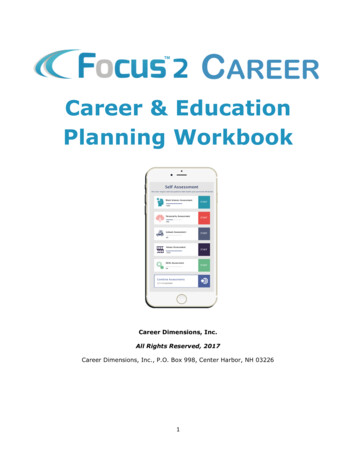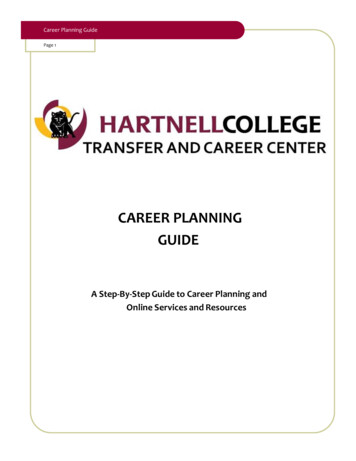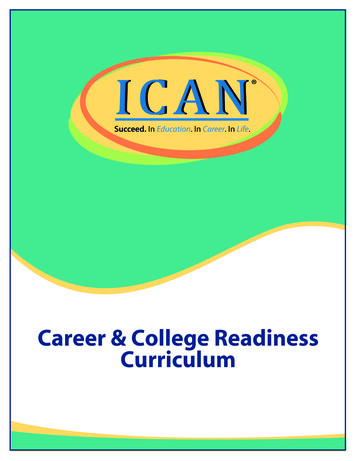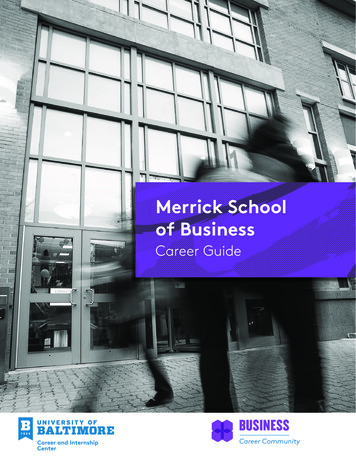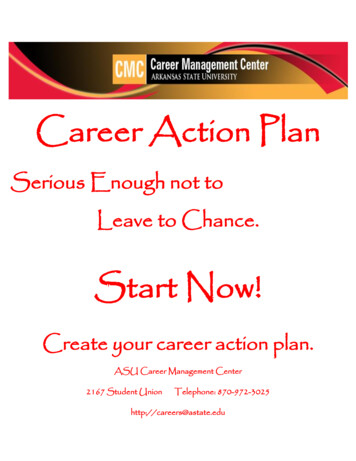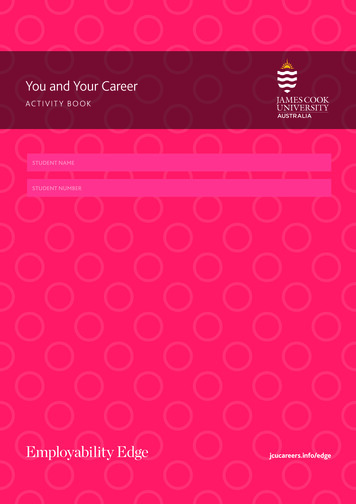
Transcription
You and Your CareerAC T I V IT Y BOO KSTUDENT NAMESTUDENT NUMBEREmployability Edgejcucareers.info/edge
Activity 1What do I want from my life? Review the mind map below and consider the aspects important toyou and write them in the table along with some possible answers and action items.ASPECT OR QUESTIONMY ANSWERNOTES OR ACTION ITEMSExample: What Sector Do IWant to Work in?I feel drawn to a number of them, but I don’t really knowFind out more about individual sectors and seekexperiences to trial the right fit for meExample: Comfortable Level ofIncomeStarting salary 60KGrowing to at least 80K in five years
Activity 2A. The table below displays some commonly held values. Review the list, consider what eachvalue means to you and whether or not you hold it. Tick the top five values you feel moststrongly about as your personal values. Since this is not an exhaustive list, feel free to addvalue(s) that you hold and is/are not l Based on the Article “39 Core Values-and How to Live by Them” in Psychology Today, Retrieved 11 February them)Additional Values
B. For each of the values you ticked in Part A, write down action(s) that you have taken in the pastthat have expressed the values in your life. How do you think you might express that value in yourfuture career?VALUEACTION(S)RELEVANCE TO YOUR CAREERExample: KindnessIn my final year in high school, I volunteeredwith Vinnies to help refugees feel welcome.I loved to see how they flourished afterexperiencing some kindness.I want to find a career where I can exercisekindness daily, such as Social Work orNursing, and avoid settings that may forceme to compromise on this value
Activity 3A purpose is defined as the reason for which something exists or is done, made, used, etc. A career aligned with one’spurpose may give you over time more satisfaction, fulfillment and resilience in the face of adversity. One’s purpose canbe developed or discovered in the course of diverse extra-curricular experiences or while reflecting on past experiences,behaviours and preferences. One or more of the questions listed below may be helpful in clarifying your purpose.When was the last time you were in a state of flow, in the zone and totally lost track of time? What were you doing?What has made you truly proud of yourself? Why was that?If you could change anything about the world, what would it be?What topic do you find yourself continuously arguing or defending with others?What are you most afraid of for the next generation, whether you have kids or not?What do you love helping people with? What do people ask you to help them with?When was the last time you couldn’t sleep because you were so excited about what you had to work on? What was it? Whywere you so excited?How would you describe your purpose? How is your purpose likely to connect with your study and/or career? How can yourpurpose be translated in to a course of study and/or career?Summarise your thoughts below:
Activity 4A. Look at the infographic below about life and work views that is based on the ‘Design YourLife’ philosophy. Write a brief response below about your life view and also your work view(max. 250 words each). You can use some or all the questions included in the infographic andactivities covered thus far.LIFE VIEWWORK VIEW
B. How or where does your life view and work view intersect? Are any aspects of your life viewreflected in your work view? Why is it important? What does it mean for your career choices?
Activity 5A. List your key general interests and jot down some ideas about how you could pursue thoseinterests in your career and/or other areas of your life.To help identify interests, you can use the online career exploration tool called Myfutures by the Australian government.You need to sign up for a free account to access the My Career Profile – Interests section. The activities in this website willalso help you explore career pathways and develop self-knowledge for career decision making.INTERESTIDEA(S) ON PURSUING THE INTERESTTHROUGH A CAREERIDEA(S) ON PURSUING THE INTERESTOUTSIDE OF CAREERExample: yoga Study exercise physiology or physiotherapyand include yoga in your practice, and/or work as a freelance yoga instructor. Study business and run a Yoga RetreatCentre. Join a Yoga practice group. Go for a trip to India to learn more aboutYoga. Spend time at a Yoga Ashram.
B. To help you determine your work interests/styles, complete the Job Outlook Career Quiz.Write down your top three results and give an example of why this area strongly interests you.INTEREST AREAe.g. Social123REASON OR AN ILLUSTRATION ON WHY THIS IS STRONG FOR YOUEnjoy teaching younger children, organising events and helping my friends with theirproblems.
Activity 6Below is an audit form for you to examine and assess your transferable skills. Work through thelist and mark ‘D’ against skills you are still Developing, ‘C’ against those you are Competent, or‘S’ if you consider it a Strength of yours. For your ‘C’ and ‘S’ responses, write a brief description ofwhen you have demonstrated that skill for future reference. If you mark ‘D’, then write an actionfor how you will develop it through training and personal development.TRANSFERABLESKILLProblem Solving(that contributesto productiveoutcomes)EXAMPLEResearching, gathering informationOrganising, synthesising informationAnalysing, evaluating, judgingTroubleshootingIdentifying problems and solving themindependentlyLearningGrasping a concept and using the ideaUsing experience to create a conceptDealing and being open to a newsituation, ideas and techniquesObservations, listening or readingReliabilityFollowing instructions explicitlyCompleting projects, assignmentsImprovise to complete task betterCompletion of difficult tasksCommunicationwrittenWriting clear, concise papers or reportsProof reading or editingUsing words creativelyReaching people through written wordCommunicationoralListening and understandingPresenting information with understandingTeaching skillsPublic speaking skillsSpeaking clearly and directlyAbility to use foreign languageArtistic/creativeDesigning skills, creating pleasing imageUsing imaginationUsing visual representations for ideasD/C/SDESCRIPTION OF THE ACTION, TASK OR EXPERIENCE
TRANSFERABLESKILLEXAMPLENumeracyCalculating, manipulation of numbersD/C/SDESCRIPTION OF THE ACTION, TASK OR EXPERIENCEFinancial record keepingFinancial analysis, such as budgetStatistical analysisHumanrelationshipCounselling, giving adviceDealing effectively with difficult peopleNegotiating and mediatingProviding good service to a customerEmpathisingLeadershipTaking the initiative or leadMotivating or inspiring othersManaging people or resourcesTaking risks, making decisionsEntrepreneurialInnovative, able to see opportunitiesDesigning a new project or programTaking an idea and putting into actionRecognising usable ideas, conceptsBusiness knowledge and skillsTechnologyHaving a range of basic IT skills(that contributesto effectiveexecution oftasks)Applying IT as a management toolUsing IT to organise dataBeing willing to learn new IT skillsOther- please specifyYou may want to review the info sheet Skills Employers Want for further information.
Activity 7Considering what careers may feel comfortable and which ones might go against your nature (personality type) may helpyou achieve a smoother and happier journey through life. If you have an open and curious personality, you will probablyenjoy working on new projects all the time, so, for example, a career in management consultancy may be a good fit. If youhave an anxious nature, you may want to avoid careers involving confronting situations, such as a Social Worker dealing withDomestic Violence.Complete this Big 5 Personality Test and note the results. In the table below, note which aspectsof your test results need to be taken in consideration with regards to your career ideas.MYPERSONALITYASPECTExample:OpennessCAREER CONSIDERED AND HOWIT MAY INTERACT WITH MYPERSONALITYAccountant: I may get bored byrepetitive tasksWHAT ACTIONS DO I NEED TO TAKE TO TEST ORMITIGATE A POTENTIAL RISKInterview people working in a variety of accountingsettings; investigate chartered, forensic or managementaccounting
Activity 8Personal attributes, as opposed to skills, are related to who we are and what attitudes we may be inclined to display. Somepersonal attributes can more valued by employers than others.In the table below, tick the ones you have consistently displayed in the past as Y (Yes), andS(Strength) if you consider the attribute your strength. Describe briefly the instance in which youdisplayed the attribute.N.B. Strength is defined as something you are good at (a skill or personal attribute), deploy frequently and energises you.PERSONAL ATTRIBUTECan do attitudeLoyaltySelf tability/flexibilityCoping with uncertaintyPersistence, sustainedeffortResilience, not giving upEnergy and focusYSEXAMPLE OF PAST DEMONSTRATED BEHAVIOUR
Activity 9Goal setting. Consider the results of your self-reflection and articulate your career goal at thispoint in time.What is your goal?For your goal to be possible to implement with success, it needs to be SMART.S – Is your plan specific? (Who? What? Where? When? Why?)M – Is it measurable? How will I measure progress? (How many? How much?)A – Is it attainable? (Can this really happen? Attainable with enough effort? What steps are involved?)R – Is it realistic? (What knowledge, skills, and abilities are necessary to reach this goal?)T – Is it time-bound? (Can I set fixed deadlines? What are the deadlines?)Your plan - now list five action steps to help you reach your goal.Remember to keep your steps SMART12345
A. Look at the infographic below about life and work views that is based on the 'Design Your Life' philosophy. Write a brief response below about your life view and also your work view (max. 250 words each). You can use some or all the questions included in the infographic and activities covered thus far. LIFE VIEW WORK VIEW


